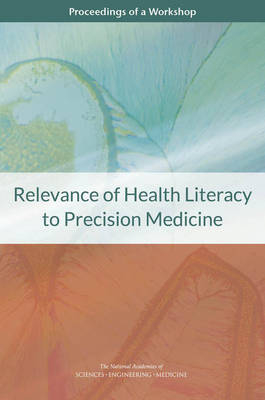
Relevance of Health Literacy to Precision Medicine
Proceedings of a Workshop
Seiten
2016
National Academies Press (Verlag)
978-0-309-44732-4 (ISBN)
National Academies Press (Verlag)
978-0-309-44732-4 (ISBN)
On January 20, 2015, President Obama announced the Precision Medicine Initiative (PMI) in his State of the Union address. The PMI, by developing new approaches for detecting, measuring, and analyzing a wide range of biomedical information including molecular, genomic, cellular, clinical, behavioral, physiological, and environmental parameters, is intended to enable a new era of medicine in which researchers, providers, and patients work together to develop individualized care. Part of this effort included the creation of a national, large-scale research participant group, or cohort. The PMI Cohort Program is aimed at extending precision medicine to many diseases, including both rare and common diseases such as diabetes, heart disease, Alzheimer's disease, obesity, and mental illnesses such as depression, bipolar disorder, and schizophrenia, by building a national research cohort of 1 million or more U.S. participants.
An important challenge to assembling the PMI Cohort will be to reach individuals who are socioeconomically disadvantaged. Individuals who are socioeconomically disadvantaged have lower health literacy; often belong to racial, ethnic, and minority communities; and are often less likely to participate in research studies and biorepositories. To explore possible strategies and messaging designs, the Roundtable on Health Literacy formed an ad hoc committee charged with planning and conducting a 1-day public workshop on the intersection of health literacy and precision medicine. The workshop participants discussed a variety of topics including an overview of precision medicine and its potential, the relevance of health literacy to the success of precision medicine efforts, and perspectives and understanding of different groups, such as health care providers, consumers, and insurers. This publication summarizes the presentations and discussions from the workshop.
Table of Contents
Front Matter
1 Introduction
2 Genetic Literacy
3 The Intersection of Health Literacy and Precision Medicine
4 Health Literacy in Precision Medicine Research
5 Communicating Risk and Uncertainty in the Clinical Setting
6 Communicating with the Public
7 Reflections on the Day
References
Appendix A: Workshop Agenda
Appendix B: Biographical Sketches of Workshop Speakers, Moderators, and Reactors
An important challenge to assembling the PMI Cohort will be to reach individuals who are socioeconomically disadvantaged. Individuals who are socioeconomically disadvantaged have lower health literacy; often belong to racial, ethnic, and minority communities; and are often less likely to participate in research studies and biorepositories. To explore possible strategies and messaging designs, the Roundtable on Health Literacy formed an ad hoc committee charged with planning and conducting a 1-day public workshop on the intersection of health literacy and precision medicine. The workshop participants discussed a variety of topics including an overview of precision medicine and its potential, the relevance of health literacy to the success of precision medicine efforts, and perspectives and understanding of different groups, such as health care providers, consumers, and insurers. This publication summarizes the presentations and discussions from the workshop.
Table of Contents
Front Matter
1 Introduction
2 Genetic Literacy
3 The Intersection of Health Literacy and Precision Medicine
4 Health Literacy in Precision Medicine Research
5 Communicating Risk and Uncertainty in the Clinical Setting
6 Communicating with the Public
7 Reflections on the Day
References
Appendix A: Workshop Agenda
Appendix B: Biographical Sketches of Workshop Speakers, Moderators, and Reactors
1 Front Matter; 2 1 Introduction; 3 2 Genetic Literacy; 4 3 The Intersection of Health Literacy and Precision Medicine; 5 4 Health Literacy in Precision Medicine Research; 6 5 Communicating Risk and Uncertainty in the Clinical Setting; 7 6 Communicating with the Public; 8 7 Reflections on the Day; 9 References; 10 Appendix A: Workshop Agenda; 11 Appendix B: Biographical Sketches of Workshop Speakers, Moderators, and Reactors
| Erscheinungsdatum | 29.01.2017 |
|---|---|
| Verlagsort | Washington |
| Sprache | englisch |
| Maße | 152 x 229 mm |
| Themenwelt | Medizin / Pharmazie ► Gesundheitswesen |
| Studium ► Querschnittsbereiche ► Prävention / Gesundheitsförderung | |
| ISBN-10 | 0-309-44732-1 / 0309447321 |
| ISBN-13 | 978-0-309-44732-4 / 9780309447324 |
| Zustand | Neuware |
| Haben Sie eine Frage zum Produkt? |
Mehr entdecken
aus dem Bereich
aus dem Bereich
Orthomolekulare Medizin in Prävention, Diagnostik und Therapie
Buch | Hardcover (2022)
Thieme (Verlag)
71,00 €
Lehrbuch zur berufsspezifischen Ausbildung
Buch | Softcover (2021)
Kohlhammer (Verlag)
46,00 €


